Legacy of Excellence
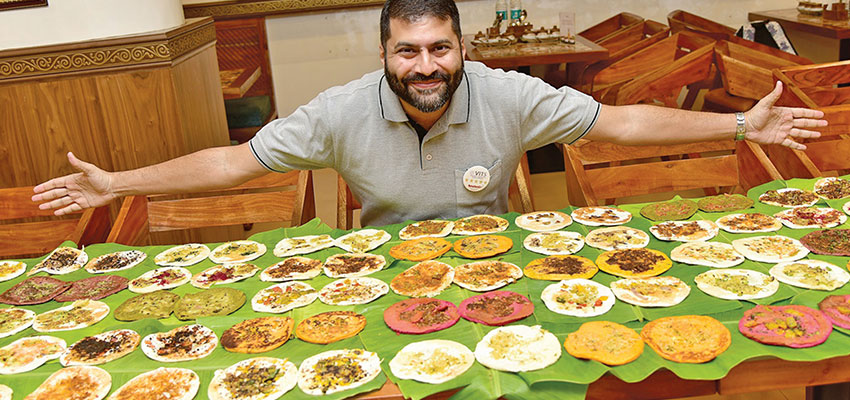
An entrepreneur, hotelier and an author with 8 books to his credit, Vikram Kamat, Founder and CMD, the VITSKamats Group, is a pioneer in the art of hospitality with a legacy of excellence. With a professional journey spread across over a nearly two decades, under his leadership the iconic Kamats brand has achieved incredible milestones in its journey. He is known to spearhead technology in the world of food, which has been a significant driving force behind expanding Kamat’s legacy, expanding its footprint across India. In an exclusive interview with Corporate Citizen, Vikram Kamat shares his journey in guiding the Vitskamats Group, their journey in serving India’s diverse and rich culinary traditions, their unmatched excellence in the culinary world and much more
The VITS brand was founded in 2007, as a separate entity (brand). “The idea was to onboard independent investors, enabling us to grow as a brand, independent of the Orchid Hotels. I helped in the expansions, beginning with the Orchid Pune, Orchid Bhubaneswar, Orchid Puri, and Fort JadhavGadh. I soon realised that I had an opportunity to grow and create something of my own with the Vitskamats Group”, said Vikram Kamat, Founder and CMD, of the VITSKamats Group.
The company went public on 15 February, 2016, on the Bombay Stock Exchange, helping Vikram create his identity and success. “We had numerous firsts, including the youngest ever listing for a hospitality chain, with the highest ever oversubscription,” said Vikram. As one of the youngest promoters then in the hospitality business, the group is also one of the rare Indian hospitality companies to have applied for patents.
Sustaining a legacy
Operating under VIDLI Restaurants Ltd, the flagship company runs 80+ hotels, restaurants, and F&B outlets. Besides this, the company runs two skill-based academies, to train hands for the groups’ varied hospitality divisions. Initially, the group that sought to fulfill core hospitality, has been steering allied hospitality divisions, including accounts, F&B controllers, and revenue managers. “We have been the only listed restaurant chain that has been consistently profitable since we listed ourselves some 10+ years ago, including during the Covid days”, he said.
Vikram Kamat shares his views with Corporate Citizen about striving to build a new legacy, upholding a heritage brand, and bringing in new strategies. He shares his contributions to leading the Vitskamats Group, the umbrella brand for their multiple F&B brands, including ‘Urban Dhaba’ and ‘Wah Malvan’. “Our principal focus is to upkeep the ‘Kamats’ legacy, as we believe in the universality of the brand, making South Indian delicacies, a culinary rage worldwide,” he said.
"Initially, when I branched out on my own, I did not have capital. I did not have any power hold and could not invest in my vision. I had to delve into my strength of building the legacy of the Kamats’ brand and my inherent acumen"
-Vikram Kamat
Soul Food
Corporate Citizen: Which was the first Kamats restaurant?
Vikram Kamat: The original first outlet under the Kamats restaurants started some 80+ years ago, but it was shaped into the format we know today with the property in Silvassa in 1985.
CC: What distinguishes Kamats as a mass fast and casual dining restaurant?
Kamats has always been a people’s brand and we presently operate within two formats. The regular Kamats is the original family restaurant and Kamats Legacy, the premium authentic full-service eatery, promises a traditional South Indian experience. While we have nearly 50 Kamats restaurants, we presently run five Kamats Legacy in Navi Mumbai; three are operational, with two more in the implementation stages.
CC: What is the culinary USP of the Kamats Group?
Under the Kamats Legacy, we focus on vegetarian South Indian food. In our premium service and dining format, the delights are laden on a traditional banana leaf, where our patrons are served three varieties of chutneys and Southern ‘podis’ (traditional lentil and spice mix) with Ghee and various authentic South Indian dishes. The recipe origins are primarily based on authentic recipes from Karnataka, Kerala, Andhra Pradesh, Telangana, and Tamil Nadu.
Market gastronomies
CC: What distinguishes Vitskamats from other hospitality establishments?
We primarily focus on multiple innovations within the industry. We were one of the first to have focused on the mid-market segment with the branded F&B idea. We run our skill academy based on the ‘Earn and Learn Scheme’ in the hospitality sector with 12th equivalence and graduation facilities, which is a first in India. We have been running a ‘Sales Agent’ business programme, another first in the sector. Our loyalty programme has been running seamlessly across all our hotels and restaurants, including our select retail shops in a few cities.
"Our DNA rests on the F&B segment. We view hotels as ‘restaurants with rooms’ rather than how most hoteliers think of providing ‘rooms with some F&B facilities’ Most of our programmes and thought processes revolve around the USP of F&B"
CC: What is your unique value proposition?
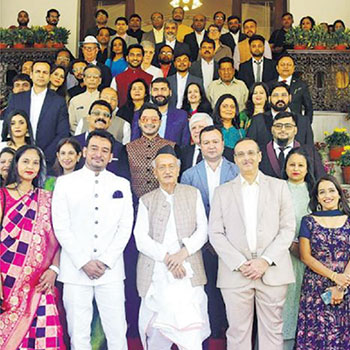
Our DNA rests on the F&B segment. We view hotels as ‘restaurants with rooms’ rather than how most hoteliers think of providing ‘rooms with some F&B facilities’. Most of our programmes and thought processes revolve around the USP of F&B as our core competency, building allied services on the go.
CC: What is the group's business clincher?
I would say that food is in our blood. We think, live, and breathe ‘food’, and in our F&B operations, we believe in minute details in operating the F&B segment, streamlining the quick service of our beverage segment. We deal with volume transactions in the F&B sector, serving 15000+ people daily, and therefore, we assess each task and item. It ensures consistency and happy guests across our chains and network.
CC: What differentiates the Kamats Legacy model?
We set up Kamats Legacy across Mumbai’s locations in Bhandup, Nariman Point (2023) and Vashi(2024). Initially, when I branched out on my own, I did not have capital. I did not have any power hold and could not invest in my vision. I had to delve into my strength of building the legacy of the Kamats’ brand and my inherent acumen. I therefore began a franchise model and the simplest format. I understood the market gap and opened our eateries alongside highways, providing amenities including clean toilets and hot healthy hygienic food.
CC: What is the status of your highway eatery model?
Despite initial hiccups, we built a successful model. However, to arrive at the best format, we rectified the model elements several times, incurring financial risks, difficulties, and friction. But, it was the need of the hour then. Presently, I have not extended further franchisees as we have built a significant base with the appropriate partners. I rely on owners who believe in my philosophy rather than the capital boost alone. In the initial stages, I had to grow the chain and create a volume presence so I partnered with anyone who waved a cheque and prayed for the chain’s success. During the Covid lockdown, most of the poor franchises and financial franchises had to shut shop.
Strategic expansions
CC: How have you strategically led expansions from 2015 to 2024?
We strategised and focussed on profitable growth. We have not grown for the sake of numbers, additions or capturing the market. We are a little selective about the owners we collaborate with, as I prefer to work with people I get along with and those who understand our core operations. If they are in line with our philosophy of success, it enables a faster, easier, more satisfactory, and enjoyable journey, leading to innovations and growth.
CC: What are the key mantras for success in the dynamic restaurant/ hospitality business?
I believe the industry requires grit, persistence and focus. There are so many moving parts, and inadvertently one can easily get sucked into the myriad of issues and lose track of the larger picture and objective. It is a people-centric business, and no two people are the same. So within your team too, one has to keep everybody moving in the same direction, in different situations and at different times.
CC: What are the challenges in matching customer expectations?
With the Kamats and Kamats Legacy brands, we focus on South Indian cuisine. However, in the VITS hotel entities, it is a challenge across various Tier-2 and Tier-3 cities, due to the unavailability of local staff (trained or untrained). Nonetheless, we match our brand’s worth across these hotels, matching our guests’ expectations. An instance is with demand for a simple pasta dish for kids even in the temple town of Dwarka, with a low overall population. In such towns, long-term staff retention is an issue. In the four of our 5-star and premium hotel chains, we manage within the mid-market segment, which is more challenging. Yet, our operational analysis enables us to optimise our strength in the sector.
CC: Were the VITS Pune and Bhubaneshwar convention centres in 2008-2009, your brainchild?
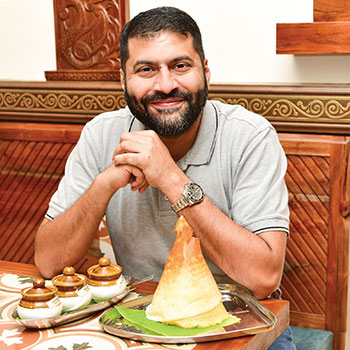
Yes, I launched Maharashtra’s largest pillar-less, spanned dome and convention centre in Balewadi, Pune. At the time and for many years thereafter, it was one of a kind until recently with the opening up of the Jio centre. The Balewadi centre constitutes 60,000+ square feet of columnless air-conditioned hall and function centre. We have conducted several events and music shows, and organised Pune’s annual mega New Year’s event. The centre also conducted the largest-ever Indian Chamber of Food and Agriculture exam, since it was easy for examiners to see all the students in one shot.
CC: Share your project experiences across India.
I steered the Odisha cluster of the company, including Bhubaneswar, Konark, Puri, and other locations. It has been a unique learning experience, especially with the Bhubaneshwar Convention Centre. We had to work within cultural sensitivities. In Odisha, everything, including government offices, remains shut on Amavasya (new moon) days. Likewise, in Kolkata, no work gets done during the Durga Puja festivities. Yet, we managed to run our projects during such events.
International shores
CC: Why did you choose Thailand (2017) for commencing your international operations?
Initially, we embarked upon Thailand as a consultancy agreement for handholding and training for a year in the hotel sector. We learned about the market and realised that we could easily foray into it, which we accomplished. We leased two hotels. However, the second hotel we leased was a little before the Covid pandemic and we ended up losing all the money. The loss was more than what we had earned from the first hotel. We eventually gave up on the leased entities. I believe that Thailand is a good market as Indians are the second largest visitors to Thailand.
CC: What has been your international strategy?
Our international strategy is more focused and we often get regular inquiries for Kamats restaurants and Kamats Legacy brands. Our backend plan is geared to develop the setup, some six to eight months or longer before the store/establishment is launched. It allows us to prepare the groundwork since these are long-term strategic goals and the demand for authentic South Indian food is very much omnipresent. Today, we have over 30 hotels under the VITS brand worldwide.
Talent development
CC: What was the idea around your management trainee programme and leadership development centre?
We realised early on, and in my learning of managing my father’s business, that the entire bottleneck is at the middle to upper level in any company. Likewise, there are not enough competent leaders, because understanding leadership philosophy takes time. Most of the learnings are when the going is tough. We ran a management programme very early on, which helped us to create a good quality management cadre.
"Our principal focus has been to upkeep the ‘Kamats’ legacy, as we believe in the universality of the brand, making South Indian delicacies a culinary rage worldwide"
CC: Why is talent development essential?
It blends in with our philosophy. Each member undergoes essential training, akin to the Army. We all wear uniforms, including me. I am focused on the organisation’s culture and believe it to be a precursor for talent development. I have exited hotels where I encountered unethical partnerships and those that did not fit in with the organisation’s philosophy. I believe,talent that develops in the right environment and a proper ecosystem alone can appreciate talent. I was talented, but not appreciated. Now that I’m successful because of my talent, money seeks me. Therefore, our ‘Earn and Learn’ and other talent development strategies exemplify my inclination for developing people. Their loyalty to stay with me or come back to me is proof that I have been able to nurture the right ecosystem for the right talent.
CC: What is the model of the Kamats Hospitality Academy of Skill (KHAS)?
KHAS is my brainchild and is based on my realisation of the huge talent gaps in the hospitality industry. I observed that very few candidates from hotel management schools join the hospitality sector and that a bulk of them join from other sectors like call centres, IT and even corporate admin teams. Most lack skill-based aspects and this had to be identified and resolved. It led us to start India’s first ‘Earn and Learn’ programme which has been successful. At a time when hotel management colleges failed to secure admissions, we experienced a greater demand and have applied for a doubling of our academy seats.
"Each member undergoes essential training, akin to the Army. We all wear uniforms, including me. I am focused on the organisation’s culture and believe it to be a precursor for talent development"
CC: When was the first academy established and the scope of these centres?
The first academy was established in 2022, and thereafter we established centres in the Eastern business district of Bhandup, Mumbai, and are looking at building similar centres. We are identifying areas within each hotel to build such centres across our units in Maharashtra.
CC: How different is the academy from the other catering and elite hotel chain-led training modules?
My understanding is that most hotel management courses do not focus on the practical aspects of the business. Normally these courses are based on a 70:30 formula, where 70 per cent is theoretical and 30 per cent relates to practical acumen. In contrast, our courses are 80 per cent practical and only 20 per cent theoretical. More specifically, ours is an ‘Earn and Learn’ programme where the student receives a minimum monthly stipend of `7000. In the hospitality sector, the more popular courses charge students exorbitant fees. Our fee structure is lower and the students earn back their fees within the first 3 to 4 months.
CC: How has the academy helped you achieve your objectives?
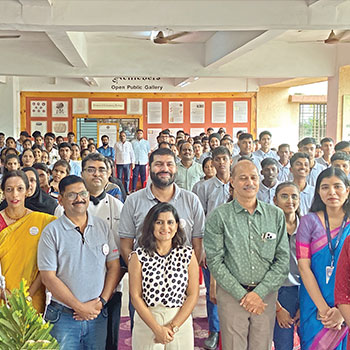
We have changed the lives of some 150+ students within 18 months of our inception, gaining commendable references. It has given us the confidence to multiply our students’ intake and also launch multiple related courses, including revenue management, hotel accounting,
HALLMARK OF A HOSPITALITY HERITAGE
The brand ‘Kamats’, with its ubiquitous presence across Maharashtra, Gujarat, and Central India, is a testimony to the grit and legacy of the Late Venkatesh Krishna Kamat. A busy boy, who washed dishes; gradually built a prominent brand within the hospitality sector. In the past eight decades, the group’s expansions, is a story that begins in 1952, when he opened his first iconic restaurant, 'Satkar', in Mumbai’s Churchgate area, shaping up the Kamat Hotels (India) Ltd on 21 March, 1986. The baton was passed on to his son, Vithal Venkatesh Kamat, Executive Chairman and Managing Director, of Kamat Hotels Group Ltd. An environmentalist, Vithal joined his father in the 1970s and is currently the Chairman of Asia’s first Ecotel hotel -The Orchid chain. In 1984, he bought a four-star hotel, 'Airport Plaza', reinstating it as Kamat Plaza, later known as Kamat Hotels. The Orchid Hotel is managed by Vithal Kamat’s older son Vishal Kamat, wherein younger sibling Vikram Kamat steers the Vitskamats Group, overseeing ‘star’ business hotels, restaurants, and the Food & Beverages (F&B) segments.
cashier and F&B controllers; which are not taught in hotel management colleges or other allied courses.
Diversification dilemma
CC: What led to foraying into the Kamats brand of packaged foods?
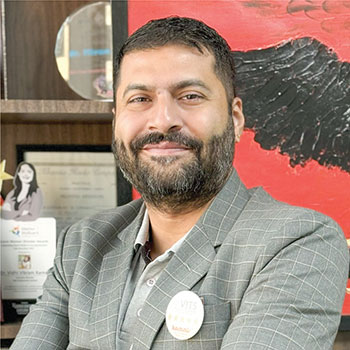
I analysed other chains and decided to increase our wallet share via off-site sales. I thought of capturing sales off the premises or as takeaways. With 80+ outlets, we felt packaged foods would be great as various packaged foods brands would rent our space and sell their products at our locations. It was an opportunity to increase our sales without any incremental cost related to space/staff or rentals. The idea has been brewing since 2017, and by 2019 was fully implemented.
CC: What was the outcome?
We managed a decent start, leveraging our brand power, and had a competitive edge over other FMCGs viz their revenue costs in building their brand. However, Covid hit and led to border restrictions. Our factory was in Silvassa and we had to cross Gujarat and Maharashtra borders which was prohibited. We lost all our distribution, and the team struggled. It impacted our core business, which was supposed to have supported the packaged food business. We decided to cut our losses and focus back on our core business.
Future take
CC: What is your advice to new wannabes in the sector?
In this business, it is essential to keep an open mind and the most important skill is your ability to work with people. Forging a professional network through people is the only bridge to grow as nothing can be accomplished alone. Taking ownership and initiative, will take you up the ladder and will have a snowballing effect as you will have gained the trust of your superiors. The buzzwords should be, “I will get it done” instead of saying, “It’s not my job”. Take a chance and learn.
CC: What are your goals for Vitskamats in the coming years?
The focus is to continue the excellent leadership position that we have earned especially in the South Indian delicacies segment. Our vision, systems and teams are attuned professionally to the South Indian culinary range, and I believe that Kamats Legacy alone can grow to 100+ locations, with at least 10 locations across Mumbai-MMR.
"I believe the industry requires grit, persistence, and focus. There are so many moving parts, and inadvertently one can easily get sucked into the myriad of issues and lose track of the larger picture and objective"
CC: What are your hobbies/passions?
I love reading especially biographies, management and case study books. With my passion for food, I try different cuisines perhaps setting the tone for inspiring new creations and flavours.
CC: How do you work-life balance?
I do not think any successful person manages a work-life balance. One is always more than the other.